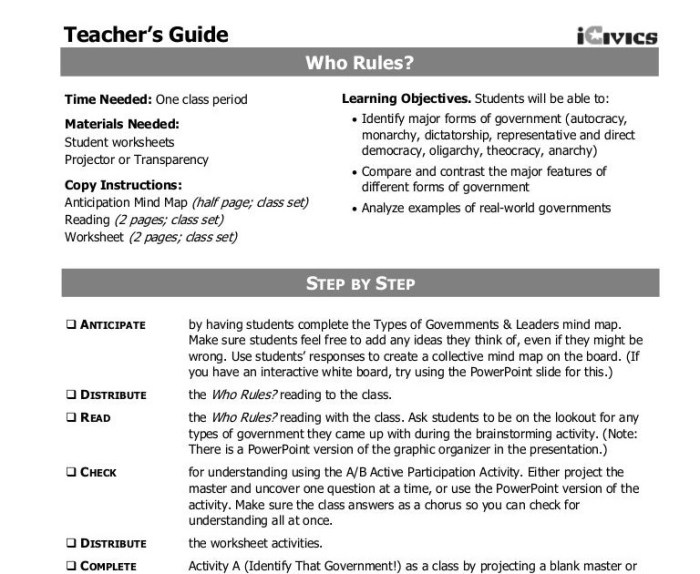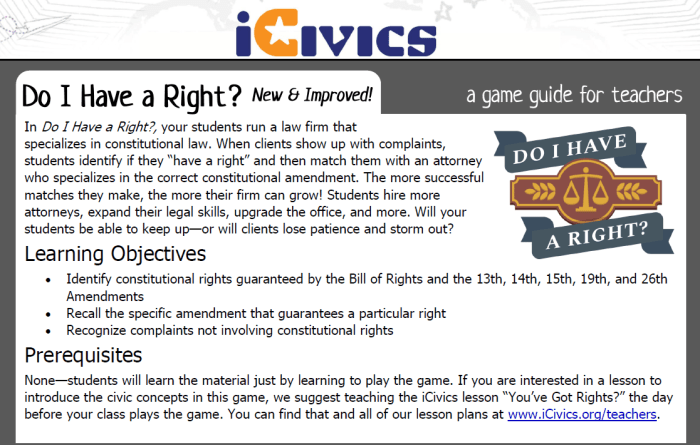Do i have a right icivics answer key pdf – Do I Have a Right? iCivics Answer Key PDF delves into the intricacies of legal rights and responsibilities, providing a comprehensive guide to the fundamental principles that govern our society. This invaluable resource unravels the complexities of constitutional, civil, and due process rights, empowering individuals with a profound understanding of their legal protections and obligations.
As we embark on this journey, we will explore the historical foundations of these rights, examine landmark cases that have shaped their interpretation, and delve into contemporary debates surrounding their application. Through a combination of clear explanations, real-world examples, and thought-provoking discussions, this guide will equip you with the knowledge and tools necessary to navigate the legal landscape with confidence.
1. Legal Rights and Responsibilities

Legal rights are the powers and privileges granted to individuals by law. Legal responsibilities are the duties and obligations that individuals are required to fulfill by law. These rights and responsibilities are essential for maintaining a just and orderly society.
How Legal Rights and Responsibilities Apply to Citizens
Citizens have a variety of legal rights, including the right to life, liberty, and property. They also have the right to freedom of speech, religion, and assembly. These rights are protected by the Constitution and other laws. Citizens also have legal responsibilities, such as the responsibility to obey the law, pay taxes, and serve on juries.
Examples of Legal Rights and Responsibilities
- Right to vote
- Responsibility to obey the law
- Right to a fair trial
- Responsibility to pay taxes
- Right to freedom of speech
- Responsibility to serve on juries
2. Constitutional Rights

Constitutional rights are the fundamental rights and freedoms that are guaranteed to all citizens by the Constitution. These rights include the right to life, liberty, and property. They also include the right to freedom of speech, religion, and assembly. Constitutional rights are the foundation of our democracy and are essential for protecting the rights of individuals.
Different Types of Constitutional Rights
- Civil rights
- Political rights
- Due process rights
- Equal protection rights
Examples of Constitutional Rights
- Right to a fair trial
- Right to vote
- Right to freedom of speech
- Right to bear arms
- Right to privacy
3. Civil Rights

Civil rights are the rights that are guaranteed to all citizens, regardless of race, religion, gender, or national origin. These rights include the right to vote, the right to a fair trial, and the right to equal protection under the law.
Civil rights are essential for protecting the rights of individuals and for ensuring that everyone has an equal opportunity to succeed.
Different Types of Civil Rights
- Right to vote
- Right to a fair trial
- Right to equal protection under the law
- Right to freedom of speech
- Right to freedom of religion
Examples of Civil Rights
- Right to vote
- Right to a fair trial
- Right to equal protection under the law
- Right to freedom of speech
- Right to freedom of religion
4. Due Process of Law: Do I Have A Right Icivics Answer Key Pdf
Due process of law is the principle that all citizens are entitled to fair and impartial treatment under the law. This principle is essential for protecting the rights of individuals and for ensuring that everyone is treated equally under the law.
Different Types of Due Process of Law
- Procedural due process
- Substantive due process
Examples of Due Process of Law
- Right to a fair trial
- Right to an attorney
- Right to cross-examine witnesses
- Right to present evidence
- Right to appeal a conviction
5. Equal Protection

Equal protection is the principle that all citizens are entitled to equal protection under the law. This principle is essential for protecting the rights of individuals and for ensuring that everyone is treated equally under the law.
Different Types of Equal Protection
- Equal protection under the law
- Equal protection in education
- Equal protection in employment
Examples of Equal Protection, Do i have a right icivics answer key pdf
- Right to vote
- Right to a fair trial
- Right to equal protection under the law
- Right to equal protection in education
- Right to equal protection in employment
Essential Questionnaire
What is the difference between a legal right and a legal responsibility?
A legal right is something that you are entitled to by law, while a legal responsibility is something that you are required to do by law.
What are some examples of constitutional rights?
Some examples of constitutional rights include the right to free speech, the right to bear arms, and the right to a fair trial.
What are some examples of civil rights?
Some examples of civil rights include the right to vote, the right to equal protection under the law, and the right to due process.
What is due process of law?
Due process of law is the principle that all people are entitled to fair and impartial treatment under the law.
What is equal protection?
Equal protection is the principle that all people are entitled to equal treatment under the law, regardless of their race, gender, religion, or other characteristics.